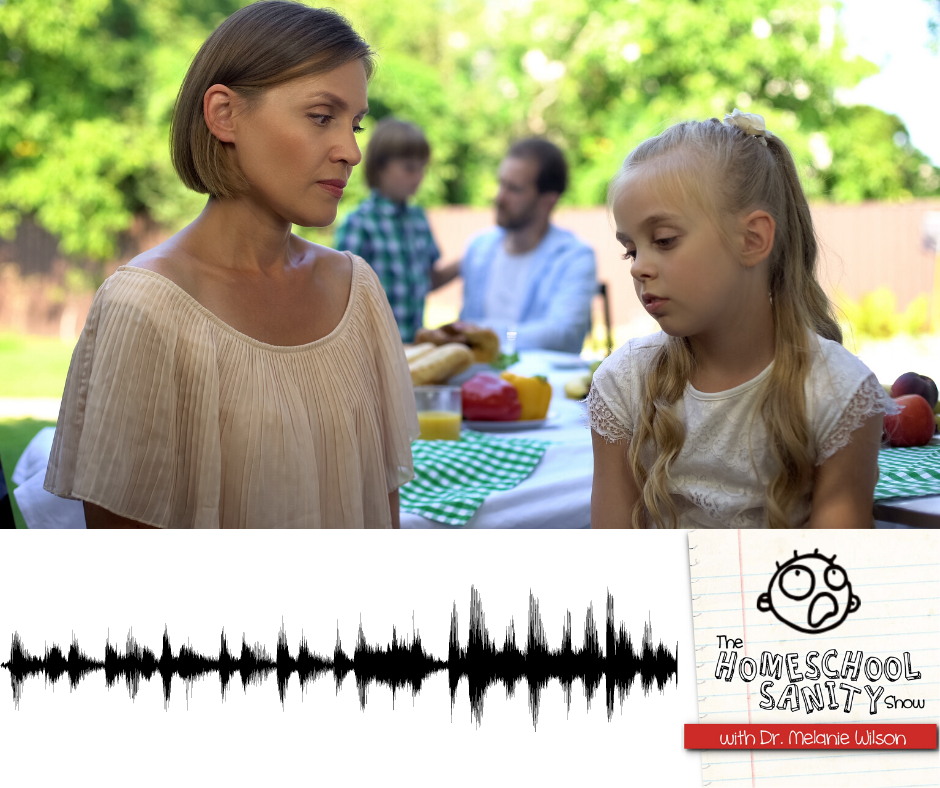
Hey, homeschoolers!
I've been talking with parents who struggle with child discipline, and I realized that I hear the same dysfunctional beliefs over and over again. I decided to share the discipline truths that can you set you free to enjoy your homeschooling in the next two episodes. Most of these truths won't be new to you, but we can all benefit from reminders. Our culture often encourages us to believe lies about child discipline, so I am going to do my part to be counter-cultural.
[button link=”http://ultimateradioshow.com/disciplinelies” type=”big” color=”orange” newwindow=”yes”] Listen to the podcast[/button]
Before I discuss the first discipline lie, I encourage you to check out the class I created for angry parents. The cost for this valuable, life-changing class, specifically designed for Christian homeschool parents? Just $7. I have been told the price is too low, and maybe it is. I want people to understand that it's not a cheap class. But I also want many who need the help in changing a anger habit to have access to the class. My advice to you is to grab it before I increase the price.
Podcast Sponsor
I also want to thank my sponsor for this episode: the Homeschool Moms Science Podcast
This new podcast is specifically geared toward helping homeschool moms teach and enjoy science.
Now for today's topic: 3 child discipline lies that make homeschooling harder
#1 My child is an exception to the rules
One of the most common discipline lies I hear from parents is that their child is in some way an exception. The child has special needs, the child has numerous mental health diagnoses, or the child is strong-willed to an extent that has never been seen before. Because of these exceptional differences in the child, this child cannot be disciplined. Nothing will work. Or at least nothing traditional. Parents of these exceptional children tell me that standard child training principles will not work, so they wait as I scan my memory for a magic bullet. Perhaps I have heard of some new, powerful technique or some ancient practice that has been intentionally hidden from parents.
I have fallen for this lie many times, I am sad to say. I have watched Supernanny with the same anticipation, waiting for her to teach parents a new trick for an exceptionally out-of-control child. But I have never seen her pull out a magic solution. In fact, she teaches many of the same parenting principles that are taught in the Bible, and that have been used for centuries. I firmly believe that they work with any child who is capable of misbehaving.
I do offer parents of difficult-to-discipline children this disclaimer, however. Children who have learning disabilities, mental illness, or a very strong will are going to require more training, more time, and more patience on your part. You may need a professional to coach you through the child discipline. That is especially true if you are disciplining a child from an abused or neglected background. In this case, you need support and help in training your children.
But let me be clear. All children, regardless of their circumstances need discipline. Proverbs 13:24 reads “Whoever spares the rod hates his son, but he who loves him is diligent to discipline him.” You do not have to spank your child, but if you love her, you will discipline her.
Lie #2 I can't discipline my child because my spouse and I don't agree
If I can convince a parent that even the most challenging child can and must be disciplined, the next lie served up often has to do with lack of agreement on discipline in the marriage. Whether you are married or divorced, the idea is that child discipline can only be effective if you and your spouse are parenting the same way. So if your husband doesn't agree with the discipline approach you're using, doesn't help you discipline, or won't listen to this podcast, then you can't discipline your child.
The truth is all moms and dads parent differently. And most parents have some disagreement about how children should be disciplined. Even if we agree, our follow-through isn't going to be perfectly in sync. So if we use lack of agreement as an excuse, we will never discipline our children. Both mom and dad point the finger at the spouse to place blame for an incorrigible child, when both should point the finger back at themselves.
There is no question that a united front makes child discipline more effective. But the idea that we have to wait for our spouse to get on board to train our children is complete hogwash. When your child is with you, he can be taught to respect and obey you.
To get your spouse on board, you can share what works for you and ask if he is interested in trying it. You can ask if he would be willing to see a professional to seek child discipline advice. And you can pray. Ephesians 4:2-3 says “Be completely humble and gentle; be patient, bearing with one another in love. Make every effort to keep the unity of the Spirit through the bond of peace.” If we don't enjoy unity in our discipline approach, we can still pursue unity with our attitudes.
Lie #3 My child should always like school, life, and especially me
Because I sell curriculum, I talk to a number of parents who have a hard time finding curriculum their children like for an entire school year. The child might say they like a curriculum at first and then say it's boring and want something else. Or they might enjoy homeschooling, soccer, or a co-op for a while and then they want to quit. How, these parents wonder, can they find something their child will like for the long-term? They also wonder what they're doing wrong that they're child isn't happy.
These parents don't seem to remember their own childhoods. Did we love every day of school, every subject, or every activity? Boredom and a desire for variety is natural for children, but we don't have to indulge it. For the most part, we have the freedom to change curriculum, drop classes, and quit participating in a child's activities. But doing so every time a child decides she doesn't like something is not disciplining her. We want to give our kids the expectation that they must honor their commitments, especially when dropping something negatively affects other people or costs money. Involve your child in the decision-making process. Explain the length of the commitment or the financial consequences of making a change. This is preparing children for adult life. Breaking contracts comes at a cost for us as adults and potentially a loss of reputation.
If we believe the lie that children should always like school and life, we can end up losing a lot of time and money in not disciplining our kids. But an even more costly lie is that our kids should always like us. If they're angry with us, we think we are doing something wrong. But the opposite is likely true. Of course, we don't want to deny our kids everything. Their not liking us would be justified in that case. But if our kids don't like us for saying no to something we know is not the best choice for our kids, then we are disciplining appropriately. And if we have otherwise positive relationships with our kids, they'll get past it. Hebrews 12:11 tells us “No discipline seems pleasant at the time, but painful. Later on, however, it produces a harvest of righteousness and peace for those who have been trained by it.” If you love your children, you'll allow them to be unhappy at times–even with you.
Conclusion
To summarize these three lies, every child needs discipline because discipline is love. No exceptions. You and your spouse don't have to agree for you to discipline your child. Discipline when your child is with you. Finally, your child doesn't have to like school, life, or you, but she must be trained to respect you.
Thanks again to my sponsor, The Homeschool Moms Science Podcast. Join me next time as I discuss three more discipline lies that make homeschooling harder.
Have a happy homeschool week!

